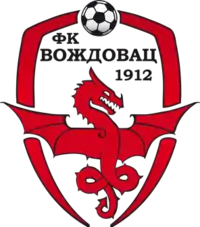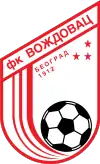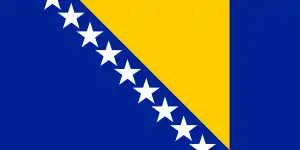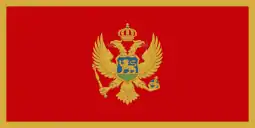FK Voždovac
Fudbalski klub Voždovac (Serbian Cyrillic: Фудбалски клуб Вождовац), commonly known as Voždovac, is a professional football club located in Voždovac, a municipality of Belgrade, in Serbia.
 | |||
| Full name | Fudbalski klub Voždovac | ||
|---|---|---|---|
| Nickname(s) | Zmajevi (The Dragons) | ||
| Founded | 1912 | ||
| Ground | Voždovac Stadium, Belgrade | ||
| Capacity | 5,174 | ||
| Chairman | Momir Veljković | ||
| Manager | Jovan Damjanović | ||
| League | Serbian SuperLiga | ||
| 2019–20 | Serbian Superliga, 8th | ||
| Website | Club website | ||
|
| |||
They are one of the few clubs in the world who have a modern stadium on top of a shopping centre, the stadium was built in 2012 and opened in August 2013.
The club is nicknamed " The Dragons ", they experienced little success in the Yugoslavian era, but have become one of Belgrade's best and most stable clubs in modern times since Serbia's independence.
The name Voždovac is derived from the word vožd meaning leader (literally, a "duke", "supreme vojvoda"), one of the titles used by the Karađorđe Petrović, the leader of the First Serbian Uprising.
Voždovac (Serbian Cyrillic: Вождовац, pronounced [ʋǒːʒdoʋats]) is a municipality of the city of Belgrade. According to the 2011 census results, the municipality has a population of 158,213 inhabitants.
History
The club was formed in 1912, under the name SK Dušanovac and its president in that year was Danilo Stojanović, "Čika Dača"[1] who was also the coach in that year. The club was named after Dušanovac, a suburb in Belgrade where the club was formed. Initially it was a club whose players and followers were mostly students from the Economics Gymnasium. After the end of World War I the club substantially improved however it never archived to be in the top like other clubs such as BSK Belgrade or SK Jugoslavija.[2]
In 1929, it is renamed into Voždovački SK (Voždovački sport klub). The main success in this period was the winning of the II League of Belgrade Football Subassociation in the 1933–34 season, and the III League of Belgrade in 1948–49. In the 1963–64 season, they won the Serbian Republic League, then the Yugoslav third tier, and promoted to the Yugoslav Second League. After Red Star Belgrade's new ground Marakana was built between 1959–63, Voždovački SK played its home matches on Marakana's secondary pitch with bleachers around it.

In 1973, another local club, Sloboda Belgrade, formed in 1953 and Belgrade League champion in 1968, was dissolved. The municipal authorities decided to hand Sloboda's ground over to Voždovački, which then changed its name to FK Voždovac. The first major achievement was the winning of the Belgrade Football Association Cup in 1975. During the following three decades Voždovac competed mostly in the lower Serbian leagues, until the season of 2003–04, when they won the Serbian League Belgrade without a single defeat, achieving promotion to the Serbian First League, the national second tier.
On 28 June 2005, Železnik won the Serbia and Montenegro Cup but, struggling financially, merged with Voždovac. As a result, Voždovac gained access to the 2005–06 First League of Serbia and Montenegro, finishing in third place and qualifying for European competition. However, due to the continuing financial difficulties after the merger, club officials decided not to request the license for European competitions.
Ever since the new modern stadium opened in August 2013, the club has been one of the most stable in Serbian football due to having strong sponsorship from the shopping centre outlets that perform business under/within the stadium. A modern approach was taken by the directors of the club to attract a more younger supporter base by focusing on a new cool approach, a modern website was created for the club, which was by far the most attractive of all clubs in Serbian football apart from the big two Belgrade clubs, a new modern crest was also designed which incorporated the club's nickname with a red dragon now upon the clubs crest which replaced the old dour crest, The aim was to be different from most other Serbian clubs who either carry/carried communist-era names or their presentation technology wise is dour.[3]
Vozdovac finished the 2019/20 season in 8th place under manager Radomir Kokovic who was fired late in the season due to a run of losses, former player Jovan Damjanovic took over the managers role and guided the club to a safe mid table finish. Key players in the 19/20 season for the club were Nemanja Nikolic who top scored with 7 goals, Alen Masovic who scored 5, Milos Stojcev who also scored 5 goals, Marko Devic who scored 4 goals and Jovan Nisic who scored 3 goals. Key defensive players were Stefan Hajdin, Nenad Cvetkovic, Nemanja Pejcinovic, Marko Zivkovic, goal-keepers Marko Trkulja and Marko Ilić and Lithuanian international Justas Lasickas who was impressive at right back.[3]
Stadium
The old Voždovac Stadium was a multi-purpose stadium. It was used mostly for football matches and was the home ground of Voždovac, with a capacity of 5,780 people. It was demolished in 2011.
Voždovac play their home games at the Stadium Voždovac located on the fourth floor of a shopping center and it meets all UEFA regulations. It has 5,174 seats, the pitch is 24 meters above ground while the tallest stands are 45 meters above.
The stadium was opened for a league game against Jagodina in the fourth round of the Superliga on the 31st of August 2013. It is also the first time a Superliga game was played on artificial grass.[4]
Supporters
Groups
The organized supporters of FK Voždovac are the Invalidi (Invalids).[5] However, the first organised supporting group was formed in 1987, and was named Vilenjaci (The Elves). Initially consisted of about 30 members, mostly former and youth players from the neighborhood. Along with Vilenjaci, another group named Zmajevi (Dragons) appeared, which is simultaneously the traditional nickname of the club. Vilenjaci grew with time, and they were often involved in disturbs. They made an effort to be original in their supporting. Pirotechnical fireworks were a usual way of provoking match interruptions.[6]
In 1989, another group named Genoes United was formed in the east stand of the stadium, and by that time Zmajevi accepted to join Vilenjaci. Shortly afterwards Genoes also joined Vilenjaci on the western stand. In the season 1989–90 another group was formed, Hasini Trafikari, named after a former club player, nicknamed Hasa. Initially formed in the south stand, they would also ended up merging with Vilenjaci on the western stand. However, when it looked that the group was stronger than ever, it ended up being disbanded.[6]
In 1990, a new group, that was initially more similar to a street gang than to football fans, was formed and named Invalidi.[6] During the 1990s, the group was constantly growing, and besides football their presence was also noticed in other sports events in which the club participated, most notably in women's handball. Obviously the most inspiring period for club fans was the period the club competed in the top league. Today the group consists of about 100 young men.[7]
Friendships
The fans have a strong friendship with fans of OFK Belgrade. They also have good relations with fans of ŁKS Łomża.
Honours
- Serbian Republic League
- Winners (1): 1963–64
- Serbian League Belgrade
- Winners (2): 2003–04, 2011–12
Kit manufacturers and shirt sponsors
|
|
Current squad
Note: Flags indicate national team as defined under FIFA eligibility rules. Players may hold more than one non-FIFA nationality.
|
|
Youth and reserves
Note: Flags indicate national team as defined under FIFA eligibility rules. Players may hold more than one non-FIFA nationality.
|
|
Out on loan
Note: Flags indicate national team as defined under FIFA eligibility rules. Players may hold more than one non-FIFA nationality.
|
For recent transfers, see List of Serbian football transfers summer 2019.
Club officials
Coaching staff
| Position | Name |
|---|---|
| Manager | Jovan Damjanović |
| Assistant Manager | Marko Savić |
| Club president | Momir Veljković |
| Sports director | Jovan Damjanović |
| General director | Miloš Mirković |
| General secretary | Nikola Radivojević |
Notable former players
This is a list of FK Voždovac players with senior national team appearances:[10]
 Dušan Anđelković
Dušan Anđelković Stefan Babović
Stefan Babović Nikola Beljić
Nikola Beljić Dušan Đokić
Dušan Đokić Miloš Kolaković
Miloš Kolaković Slobodan Marković
Slobodan Marković Miloš Mihajlov
Miloš Mihajlov Aleksandar Pantić
Aleksandar Pantić Dejan Rađenović
Dejan Rađenović Aleksandar Živković
Aleksandar Živković Mario Božić
Mario Božić Vladan Grujić
Vladan Grujić Nermin Haskić
Nermin Haskić Dušan Kerkez
Dušan Kerkez Nemanja Supić
Nemanja Supić Nikola Vasiljević
Nikola Vasiljević Tome Kitanovski
Tome Kitanovski Darko Božović
Darko Božović Darko Bulatović
Darko Bulatović Đorđije Ćetković
Đorđije Ćetković Mladen Kašćelan
Mladen Kašćelan Adam Marušić
Adam Marušić Nemanja Nikolić
Nemanja Nikolić Nikola Vujnović
Nikola Vujnović Marko Dević
Marko Dević
For the list of all current and former players with Wikipedia article, please see: Category:FK Voždovac players.
Coaching history
- Danilo Stojanović (1912) [2]
- Mlađa Mitrović
- Dušan Jevrić (2006–07)
- Miroslav Vukašinović (Feb 26, 2007–07)
- Čedomir Đoinčević (2007–08)
- Dragi Kaličanin (2008–09)
- Mihajlo Ivanović (July 1, 2012 – March 31, 2013)
- Aleksandar Janjić (April 1, 2013 – June 30, 2013)
- Nenad Lalatović (July 1, 2013 – Jan 16, 2014)
- Zoran Milinković (Jan 18, 2014–)
References
- Srbislav Todorović: "Football in Serbia 1896 – 1918", pag. 153
- "Čika Dačine uspomene 1903 – 1953", Belgrade 1953, pag. 52 (in Serbian)
- "Vozdovac-Vesti". fkvozdovac.rs (in Serbian). 2020-07-30. Retrieved 2020-07-30.
- "Kako izgleda srpski fudbal na krovu tržnog centra". Mondo Portal (in Serbian). Retrieved 2020-05-06.
- FANATIK: Kup je praznik za Ultrase! at mozzartsport.com, 24-9-2014, retrieved 19-4-2016 (in Serbian)
- "ИНВАЛИДИ ВОЖДОВАЦ | ИСТОРИЈА" (in Serbian). Retrieved 2020-05-06.
- Story and history at Invalidi website (in Serbian)
- "First Team". FK Voždovac official website. Retrieved 30 July 2020.
- "Licensed for the Serbian SuperLiga". superliga.rs. Retrieved 1 September 2020.
- FK Voždovac at National-Football-Teams.com
External links
- Official website (in Serbian)
- Club profile and squad at Srbijafudbal